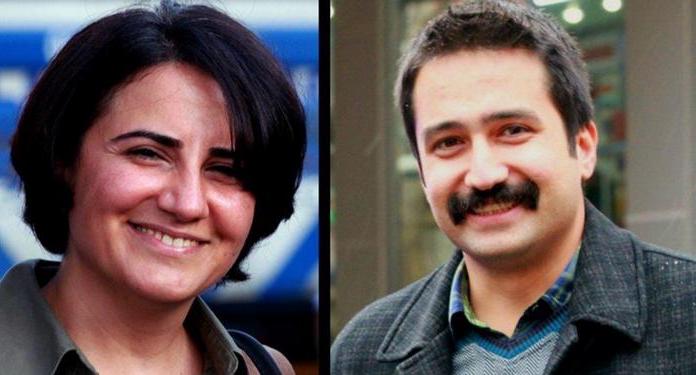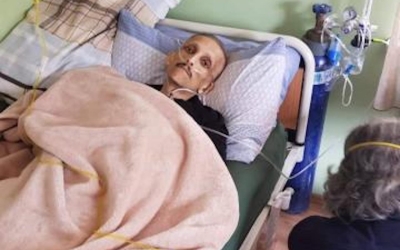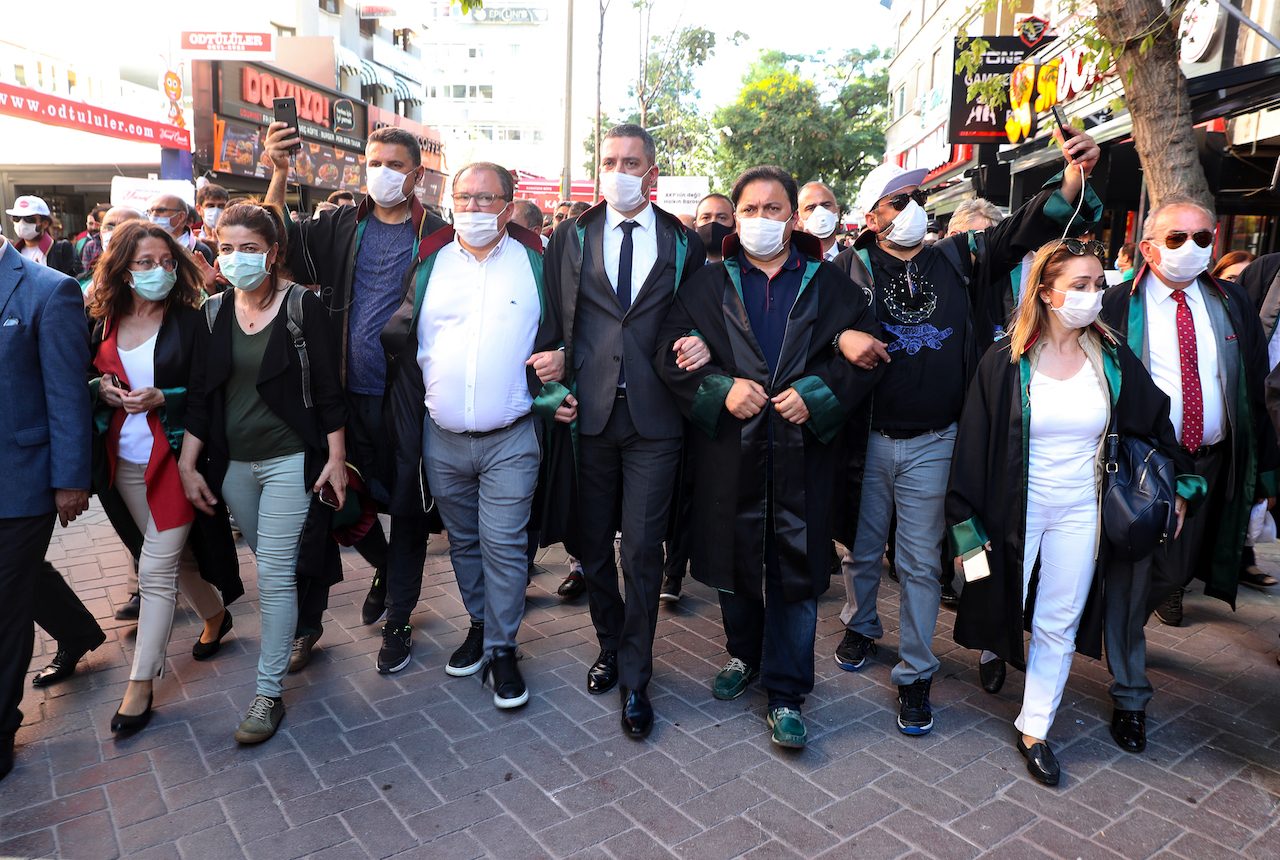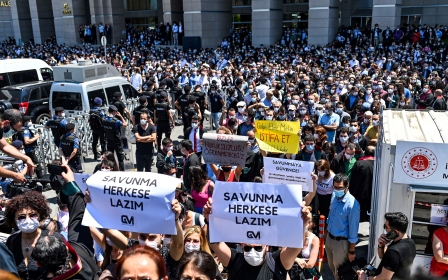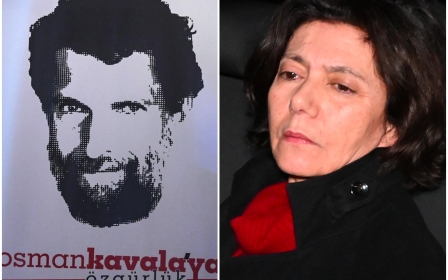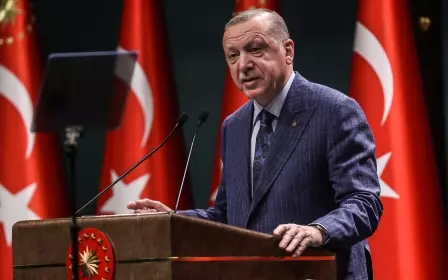'My soul has bled': Turkish lawyer talks of pain of outliving colleague after hunger strike
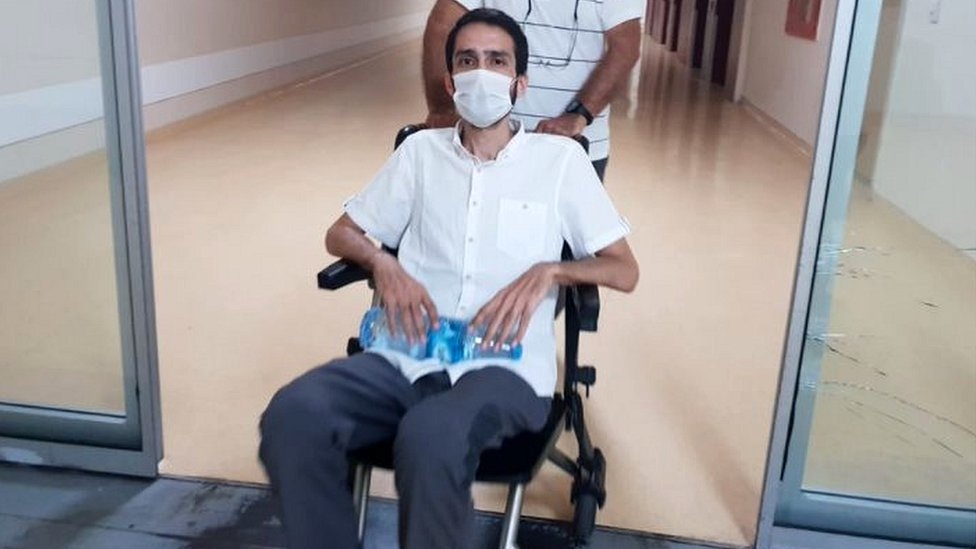
Aytac Unsal could have become the latest in a line of activists in Turkey to die while staging a "death fast", a lethal tool used as a last resort to pressure the authorities into acknowledging their demands.
A lawyer affiliated with the Progressive Lawyers Association (CHD) and the People's Law Bureau, Unsal had been in prison since September 2018, accused of having links to the outlawed left-wing armed group the Revolutionary People’s Liberation Army/Front (DHKP/C).
However, on 3 September - after 213 days on hunger strike - Unsal was released from jail on health grounds.
His colleague, fellow imprisoned lawyer Ebru Timtik, was not so lucky. She died on 27 August after 238 days on hunger strike. By the end the 42-year-old weighed only 30kg.
Now receiving medical treatment, Unsal told Middle East Eye of his shock and sadness when first hearing of the death of his friend and colleague.
New MEE newsletter: Jerusalem Dispatch
Sign up to get the latest insights and analysis on Israel-Palestine, alongside Turkey Unpacked and other MEE newsletters
'She was a piece of my life - and they took a piece of my life. It was as if they had removed my heart. My soul has bled, and is branded'
- Aytac Unsal
"I froze. Many different feelings passed through my heart. In fact, I went to sleep each night preparing for this news, because I knew her condition was bad. Even her consciousness was beginning to decline, she could not walk or speak," he said.
"Everyone knew this, that she was in this state. So I was aware that death was very close. But still, no matter how much I prepared, I was covered with a great torrent of anger at that moment."
Upon his release from the Istanbul hospital where he had been transferred from jail, Unsal's body was in a damaged, emaciated state.
He said he had lost 30kg, and his feet began to "burn and ache" from nerve damage. Only a few weeks out of the hospital, receiving treatment at home from independent doctors, he said he could still walk but with great difficulty due to pain and muscle wastage, adding that he is also suffering from insomnia.
"But all of these wounds for my justice are injuries of justice, and it is my honour as a lawyer who fights for justice," he said.
As crusading lawyers, Unsal and Timtik worked together for many years on a number of high-profile cases, including the 2014 Soma mining disaster that killed 301 workers, and the death of Alevi teenager Berkin Elvan, who died from wounds sustained from a tear gas cannister fired at his head during the 2013 Gezi Park protests.
They had spent so much time together - Timtik attended Unsal's wedding - that the news of her death, though long feared, still hit him hard as he lay in the Istanbul hospital where he had been transferred from prison.
"My bony body, which was 55kg, was shaken with anger and my heart started to flutter," he said. "We had a lot of memories in all of this with sister Ebru. She was a piece of my life - and they took a piece of my life. It was as if they had removed my heart. My soul has bled, and is branded.
"I promised her at that moment to achieve our right to fair trial. After the news of her death, I continued to resist with much greater anger and determination."
No country for lawyers
Last week, rapporteurs from the Parliamentary Assembly of the Council of Europe (PACE) warned that they were concerned over declining conditions for lawyers in Turkey.
Among the incidents they cited was the decision last week by the Court of Cassation to uphold the prison sentences of 14 CHD and People's Law Bureau lawyers, including Unsal, his wife Didem Baydar Unsal and Timtik's brother Barkin Timtik, who are also lawyers.
The 14 were originally arrested in September 2017 and later convicted over alleged links to the DHKP-C. The convictions were widely condemned by human rights organisations, with Amnesty International deriding the trial as a "travesty of justice", pointing out the reliance on secret witnesses and the defence being prevented from seeing the defendents' digital data used in the indictment.
PACE noted that over 1,500 lawyers had been prosecuted in Turkey since July 2016, the date of a failed coup attempt.
“We have already expressed our shock and sadness at the death in detention of one of these lawyers, Ebru Timtik, who paid the ultimate price for her quest to ensure a fair trial," said Alexandra Louis, PACE’s general rapporteur on the situation of human rights defenders in Council of Europe member states.
Following Timtik's death, President Recep Tayyip Erdogan said that it was "unacceptable for lawyers who advocate for terrorists to also act like terrorists themselves" and warned that he would be bringing in legislation to expel lawyers linked to "terrorism" from the profession.
Apart from the arrests, a wider conflict has developed between the Turkish government and the country's powerful bar associations.
Long a thorn in the government's side, the conflict heated up in April when the Ankara Bar Association made a criminal complaint against the head of the Turkey Directorate of Religious Affairs after the official declared in one of his sermons that homosexuality "brings illnesses and corrupts generations".
In response to the controversy, the government proposed new legislation to break up the bar associations and allow for the creation of smaller bar associations in each city, where until now there had only been one allowed per city.
While Erdogan and the ruling Justice and Development Party (AKP) have claimed the move would help deal with the unwieldiness of the big organisations, critics argue that it is aimed at weakening the power of their opponents.
"They want to turn the lawyers into government officials, bureaucrats," said Unsal of the proposed legislation.
He said the bar association legislation and Erdogan's threats to expel lawyers accused of "terrorism" was ultimately intended to "destroy the practice of public advocacy".
"They do not want the judiciary, which has become a stick in the hands of the state, to be exposed by lawyers. They do not want lawyers to be involved in social opposition. They do not want lawyers to fight for the rights of the people."
'Death fasts'
The "death fast", the act of hunger striking until death, has a long history among political prisoners in Turkey. Among the most notorious acts was the 1982 death fasts in the southeast's Diyarbakir prison, which saw four Kurdish political activists - imprisoned after the 1980 military coup - starve themselves to death, an act that became one of the launching points for the Kurdistan Workers Party's (PKK) decades-long guerilla war.
In just the past year, there have been four fatal death fasts in Turkey - Helin Bolek and Ibrahim Gokcek, both members of the left-wing folk band Grup Yorum; prisoner and ally of the folk group, Mustafa Kocak; as well as Timtik.
'When I was released, I went out with sister Ebru - I now carried her heart and her mind'
- Aytac Unsal
All four had been accused of links to the DHKP-C, an underground organisation dedicated to an armed Marxist-Leninist insurrection against the Turkish state, which has been, in the past, responsible for suicide bombings, attacks on US interests, and the kidnapping of a prosecutor involved in the Berkin Elvan case.
The group draws its largest support from Turkey's Alevi religious minority - from which Bolek, Gokcek, Timtik and Kocak also came.
Unsal denied being a DHKP-C supporter and said that it was easy for the government to throw around the "terrorist" epithet to target its critics, though he said he and his colleagues had certainly defended people tried over allegations of being members of the group.
"The government can quickly judge those who are uncomfortable with the existence of power, claiming they are members of the organisation - this can be a deputy, sometimes a journalist, sometimes a student, sometimes a worker, sometimes a Republican People's Party (CHP) administrator," he said, referring to the main centre-left opposition party in Turkey, who also draw a lot of support from the Alevi community.
"From our point of view, this was the most useful accusation for the government, as we were lawyers in the DHKP-C cases...in the indictment on which we were tried, basic lawyer activities such as detention follow-ups, prison visits and our defenses were shown as crimes."
Though he is now out of jail and out of hospital, his reprieve will only last until his treatment ends - then he faces being returned to prison to finish his 10 years and six months prison sentence.
His imprisonment and the imprisonment of his colleagues and, in particular, the death of Timtik, has drawn much international attention to their plight, which, Unsal said, has left the government "seriously exposed".
He argued the outcry was largely responsible for pressuring the judiciary into ordering his release.
"I was very happy when I was released from prison, because it was the achievement of our months of struggle...the will of the power that attacked to destroy us with unlimited pressure and terror was broken," he said.
"On the other hand, I was extremely angry. Because they could have released Ebru Timtik in the same way. She could be with me now. I was very angry about this. But when I was released, I went out with sister Ebru - I now carried her heart and her mind."
Middle East Eye delivers independent and unrivalled coverage and analysis of the Middle East, North Africa and beyond. To learn more about republishing this content and the associated fees, please fill out this form. More about MEE can be found here.


